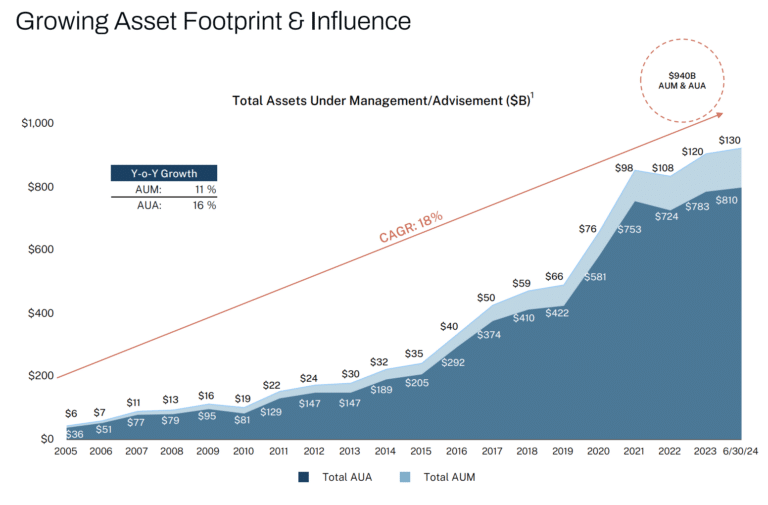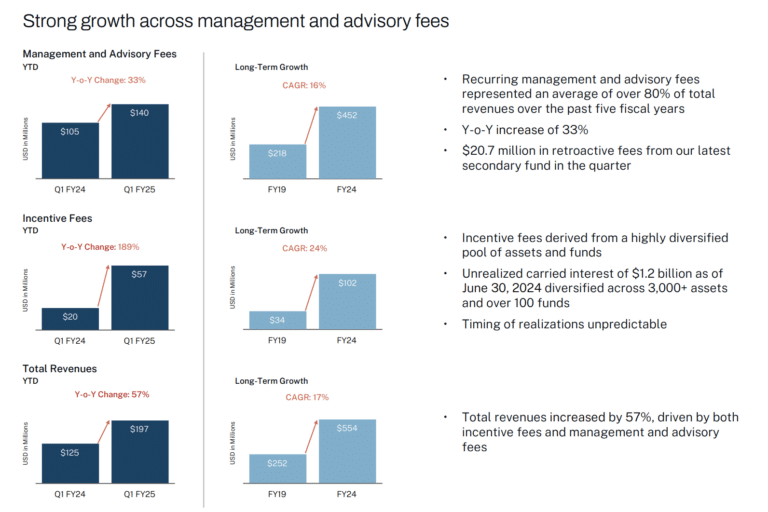

Erik Hirsch, co-chief executive of private markets asset manager Hamilton Lane, predicted that decades more growth will occur in private markets as they are expanding across many axes, including the entrance of retail.
Hirsch spoke to Barry Ritholtz, co-founder, chairman, and chief investment officer of Ritholtz Wealth Management for the Masters in Business podcast.
He has been in his current role since January 2024 and is responsible for the firm’s strategic direction and operations. Previously he had been vice chairman and head of strategic initiatives since 2016 and chief investment officer from 2003. Before joining Hamilton Lane in 1999, Hirsch was a corporate investment banker in Brown Brothers Harriman.
In the interview he said he joined Hamilton Lane after a “headhunter came knocking.”
“I was familiar with the concept of private equity and I had met some private equity firms in my short time as an investment banker,” he added. “But the concept of Hamilton Lane and what they did as a solutions provider intermediary was not something that I was familiar with.”
When he joined Hamilton Lane in 1999 as an analyst the firm had just 20 to 25 people, without areas of specialization in the investment team, and has grown to almost 800 employees. In 1999 Hamilton Lane primarily invested in private equity and was not engaged in private infrastructure or real estate.
When Hirsch became chief investment officer he said the concept of secondaries was very new and the concept of co-investing was relatively new.
“Private credit wasn’t really much of a thing, whereas today it’s a huge driver of growth,” he added. “I arrived here as a 26-year-old and am 52 today so I’ve also grown up alongside the industry.”
Institutions were just beginning to make their move into the private markets when he joined and the Hamilton Lane founders believed that investors were not going to invest time, resources, and energy to build out large internal teams to cover this asset class. He said: “That has proven to be correct and we’ve been that partner of choice for over 30 years.”
Hirsch attributed the growth in private markets to a variety of factors including performance, as private markets have meaningfully outperformed public markets over 5, 10, 15 and 20 year time periods.
Another growth factor has been diversification as public markets have become increasingly concentrated and investors ending up holding portfolios with a small number of stocks. In addition, the number of publicly listed companies has been shrinking.
However Hirsch emphasised that despite growth, private markets remain very small. He said: “If you took all of the capital raised last year across all of the sub-sectors in the industry, it wouldn’t be enough to buy Apple.”
Retail access
Hirsch believes private markets will continue to expand because they are becoming more global, expanding across strategies such as private credit and becoming accessible to a new clientele. Historically, private markets could only be accessed by institutional investors and ultra, ultra high net worth investors.
“The retail investor has finally been afforded the opportunity to take advantage of what the institutional investor has been taking advantage of for many, many years,” said Hirsch. “That’s the biggest change.”
Hamilton Lane is seeing the influx of retail capital but Hirsch said it is still very early innings. Institutions typically have an allocation to to private markets that is north of 10%, while retail has zero even though individual savers have trillions of dollars of savings. Therefore, Hirsch believes there will be a huge migration of capital into private markets.
According to Hamilton Lane’s second annual Private Wealth Survey, nearly 60% of financial professionals globally plan to allocate 10% or more to private market investments in 2025.
“Capital is coming from a different type of investor,” said Hirsch. “One who is accustomed to everything being on their phone and everything being available but private markets today are not built that way technologically.”
Therefore, private market infrastructure and interaction with the customer needs to change.
“Strategically for Hamilton Lane, we are very focused on making sure that we’re getting that market segment right,” added Hirsch. “That is a huge strategic priority.”
Although Hirsch expects the private markets industry to continue to grow in terms of assets and investors, he also expects the number of asset managers to fall because only a small number of managers will be able to successfully service retail.
For example, Hamilton Lane has tokenized funds which makes transactions cheaper, faster and easier to access for retail. Hirsch said: “We’ve tokenized more funds than anybody else in the world.”
In December last year Hamilton Lane announced a partnership with Allfunds Blockchain, the digital innovation arm of Allfunds, to further expand access to private markets for investors across Europe by offering tokenized funds via the Allfunds Blockchain platform.
If tokens become easily tradeable, then the illiquidity premium in private markets could reduce according to Hirsch, which will change how people think about benchmarking and portfolio construction.
“We’re a long way away from that,” added Hirsch. “Today the illiquidity premium exists and the illiquidity issue is still very much front and center, but you can see the building blocks being put in place that could alter how that all works.”
Geographical expansion
Hamilton Lane has 22 offices around the globe and its client base is equally split between North America and overseas. Hundreds of employees operate outside the U.S. and co-CEO, Juan Delgado-Moreira, is a Hong Kong resident and operates out of Asia.
In July this year Hamilton Lane announced the launch of its Asia Private Assets Fund, a emi-liquid vehicle that aims to provide private wealth and institutional investors with diversified access to Asia’s private markets landscape.
Collwyn Tan, co-head of Asia investments, said in a statement: “Asia drives 60% of global GDP growth, much of it through a vibrant private sector, yet most private market products focus on broad global and U.S. exposure and offer limited access to Asia. HLAPA is a pioneering offering that seeks to provide wealth professionals and investors of all sizes with seamless, diversified access to Asia’s compelling private asset landscape.”
Hirsch expects the number of offices to grow in more locations.
“India, for example, is a fairly large economy but so far has had a very small private markets industry,” he added. “That will change over time and I think you’ll likely see a Hamilton Lane office there at some point in the future.”
In July this year Hamilton Lane hired Sebastian Schu as a managing director in Germany. The firm has also relocated to a new, larger office with double capacity in Frankfurt to accommodate growth across the team. The local team now stands at eight people compared to one full-time employee in 2021.










